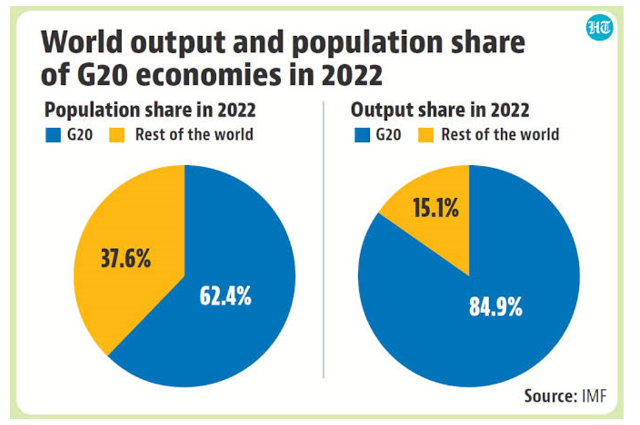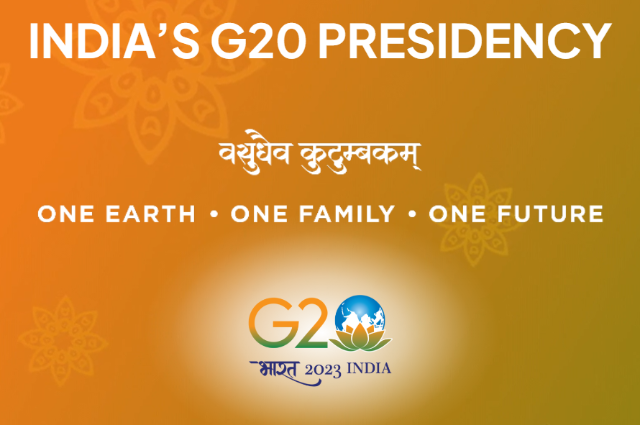INTRODUCTION:
The G20 Summit stands as a pivotal global diplomatic event, bringing together leaders from the world’s major economies to address pressing global challenges. It serves as a platform for international cooperation on issues such as economic stability, trade, climate change, and more. India’s role in hosting the upcoming G20 Summit is of great significance, as it provides the nation with a unique opportunity to shape global discussions and policies, fostering cooperation and solutions to critical issues. This summit amplifies India’s presence on the global stage and underscores its commitment to fostering multilateral diplomacy and inclusive economic growth.
BRIEF BACKGROUND:
The G20, or Group of Twenty, emerged in 1999 as a forum for finance ministers and central bank governors from 19 of the world’s largest economies, plus the European Union. Originally established in response to financial crises, its first summit was held in 2008 during the global financial issues, as well as broader global challenges such as climate change and pandemics. Its rotating presidency has showcased the prestige of hosting, with countries like the United States, China, Germany, and Argentina taking on this role, emphasizing the forum’s importance in shaping global economic policies and fostering international cooperation.
INDIA’S DIPLOMATIC PROWESS:
In recent years, India has emerged as a formidable player on the global stage, showcasing its diplomatic prowess and forging influential partnerships. With a focus on multilateralism and economic engagement, India has strengthened its ties with major powers like the United States, deepening cooperation in areas such as defense, trade, and technology. Furthermore, India’s “Act East” policy has strengthened relationships with Asian nations, enhancing regional stability and economic integration. Its leadership in international forums like BRICS and the G20 demonstrates its commitment to addressing global challenges. India’s growing influence reflects its commitment to diplomacy and its recognition as a key player in shaping the world’s geopolitical landscape.
ECONOMIC IMPACT:
Hosting the G20 Summit offers a multitude of potential economic benefits to the host city and country. Firstly, it can significantly boost tourism, as the vent attracts world leaders, delegates, and media attention, leading to increased hotel bookings, restaurant visits, and tourism-related spending. Additionally, the need for top-notch infrastructure to accommodate the summit can drive substantial investments in construction and transportation, leaving a lasting legacy of improved infrastructure. Moreover, local businesses often experience a surge in demand for goods and services during the summit, from catering to security services, to providing a short-term economic boost. Altogether, hosting the G20 Summit presents a unique opportunity for economic growth and development.

GEOPOLITICAL SIGNIFICANCE:
India’s geopolitical position is pivotal, situated at the crossroads of South Asia, the Indian Ocean region, and bordering key players like China and Pakistan. Hosting the G20 summit can significantly bolster its role in global politics. Firstly, it offers India a platform to showcase its economic prowess and diplomatic leadership on a world stage, elevating its status among emerging powers. Secondly, it fosters bilateral and multilateral dialogues with influential nations, fostering alliances and trade partnerships, particularly in the Indo-Pacific region, strengthening its strategic position. Additionally, the event can enhance India’s soft power, projecting a democratic and diverse image, and attracting investments and tourists. However, hosting the G20 also entails substantial security and logistical challenges, demanding a robust infrastructure and diplomatic fitness to navigate complex dynamics and ensure a successful summit.
KEY AGENDA ITEMS:
The G20 Summit is expected to focus on a range of critical global topics and issues, with India, the host nation, emphasizing its key priorities and objectives. India’s foremost goal is to promote sustainable and inclusive development, addressing economic recovery post-COVID-19 and ensuring equitable access to vaccines. Climate change mitigation and adaptation will also be in the spotlight, as India seeks to balance its developmental needs with environmental corners. Strengthening global cooperation on counter-terrorism efforts, enhancing digital governance, and facilitating international trade reforms are among India’s top priorities. The summit provides an opportunity for India to play a pivotal role in shaping the global agenda, fostering collaboration, and advocating for a more just and resilient world.
CULTURAL SHOWCASE:
India has taken great strides to showcase its rich cultural heritage at the event, offering a captivating glimpse into its diverse traditions. Attendees can immerse themselves in a tapestry of cultural events, including mesmerizing dance performances like Bharatanatyam and Kathak, soul-stirring classical music renditions, and vibrant folk art displays. Exhibitions will feature exquisite craftsmanship, from intricately woven textiles to ornate jewelry, exemplifying India’s artisanal prowess. Moreover, attendees can savor the culinary delights of India with a wide array of traditional dishes, from aromatic biryanis to spicy street food. India’s participation promises an enriching and multi-sensory experience, celebrating the nation’s timeless cultural treasures.
CHALLENGES AND PREPARATIONS:
Hosting a large-scale international event like a summit presents India with a multitude of challenges. Firstly, infrastructure development is crucial, necessitating significant investments in transportation, accommodation, and security. Ensuring the safety of high-profile delegates and attendees is paramount, demanding extensive security arrangements. Moreover, logistical challenges arise in terms of traffic management and crowd control. India must also focus on environmental sustainability, as such events can strain resources and exacerbate pollution. Effective communication and diplomacy are essential for fostering international cooperation during the summit. In sum, the preparations entail substantial financial investments, meticulous planning, and robust diplomatic efforts to ensure international events.
CONCLUSION:
India hosting the G20 Summit holds profound significance in the realm of international diplomacy and global economics. This prestigious event underscores India’s growing influence and status as a major player on the global stage. Firstly, it offers India a unique opportunity to shape global economic policies and discussions. As one of the world’s fastest-growing economies, India can advocate for policies that promote inclusive growth and address critical global challenges such as climate change and healthcare access. Furthermore, hosting the G20 Summit allows India to strengthen diplomatic ties with key nations, fostering greater cooperation and collaboration in various sectors. Moreover, the G20 Summit presents India with a chance to contribute significantly to global problem-solving.
In essence, hosting the G20 Summit provides India with a remarkable opportunity to assert its influence on the world stage, strengthen international partnerships, and contribute to shaping a more equitable and sustainable global future.

